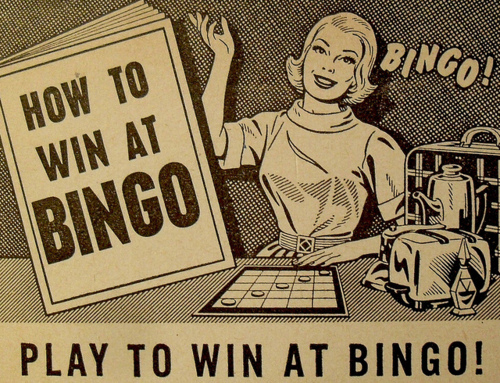That’s a Bingo!
By Mike Jones, Web Editor
The city was quiet one Sunday afternoon during the Steeler’s home opener. Coming off a day of feasting upon pierogie’s at Stage AE, we decided to continue doing the most Yinzer activities we could- because no one does Pittsburgh like Pittsburgh. On the drive down Carson Street, some 20-odd blocks East, we found the Sokol Club’s parking lot was filled to the brim. We took it as an invitation.
For those of you who don’t know what the Sokol Club is, it is a Slovakian “fraternal life insurance and benefit society.”[1] Traditionally, clubs would hold sports and gymnastic programs for the youth of the community. Id. And the recreational club in the South Side of Pittsburgh also holds Bingo every Sunday and Tuesday.
Roughly 200 people were inking their cards as the announcer drew balls and called them out. The folding tables were filled, the great majority being elderly women. Each person with as few as two boards and as many as six. Workers, including one gentleman everyone called “Uncle Mike”, would traipse between the tables handing off small games of chance or verifying called “BINGO!” Many of the players spoke to themselves, most knew one another and made passive aggressive remarks when Nancy called out “BINGO”, almost all were upset that G 61 was called every game, and only one person was stupid enough to falsely call a win on their card. Yours truly.
Just as the blood left my face and the sharp sound of whispers fell, we began to wonder- does someone regulate how this game is run? Money is changing hands with casino-like speed, and the boards, balls and calling system are all linked up. So, I sought to answer this question after I would redeem myself. We are all familiar with Bingo. 5 rows, 24 numbers, one free space, and there are several ways to win the game- a line across, diagonal, four corners. However, I submit that many of us don’t know how the game is run.
The Commonwealth has listed the laws regarding Bingo in Title 10 Chapter 7 of the Pennsylvania Statutes captioned Charities and Welfare. [2] To acquire a license for Bingo a civic or charitable association must hold bingo for the “purpose of raising funds… for the promotion of charitable or civic purposes” for a low cost of $100 dollars a year. [3] A licensed Bingo association, like the Sokol Club I visited, is only permitted to play Bingo twice a week at most. [4]
In 20 of the 25 games played, we were playing by regular rules of Bingo where winners would receive 100$. The other five games were called “Specials”, which each player would try to cover their board, get a large ‘X’ in their board, or receive “Double Postage” (a pattern of four blocks in two corners, that look like a postage stamp). In these special games, winners would receive 200$. And one lucky person may win the Jackpot through any number of tandem games. Not surprisingly, there is law that enunciates how much payout a winner can receive.
The Pennsylvania Statutes dictate that no award shall exceed 250$ for any one game of Bingo, except for jackpot games which shall not exceed 2,000$. Id. As I watched all of the cash being handed out to patrons, I was amazed. The Sokol Club must have received amazing profits just for entry to be giving out this much money. But there is a cap to how much they can dish out. The limit is 4,000$ in prizes for one day. Id.
Rarely do I become competitive, but as the final game closed and Nancy won for a fourth time- I found a fire burning in my stomach. I was repeatedly told that this is a game of chance, and chaos was shaking the balls, but that did not stop me from feeling like I could do something different, that if I learned everything I could about this game I would ball out like the older Yinzers.
[1] http://www.slovakcatholicsokol.org/
[2] 10 P.S. § 301
[3] 10 P.S. § 302
[4] 10 P.S. § 305
